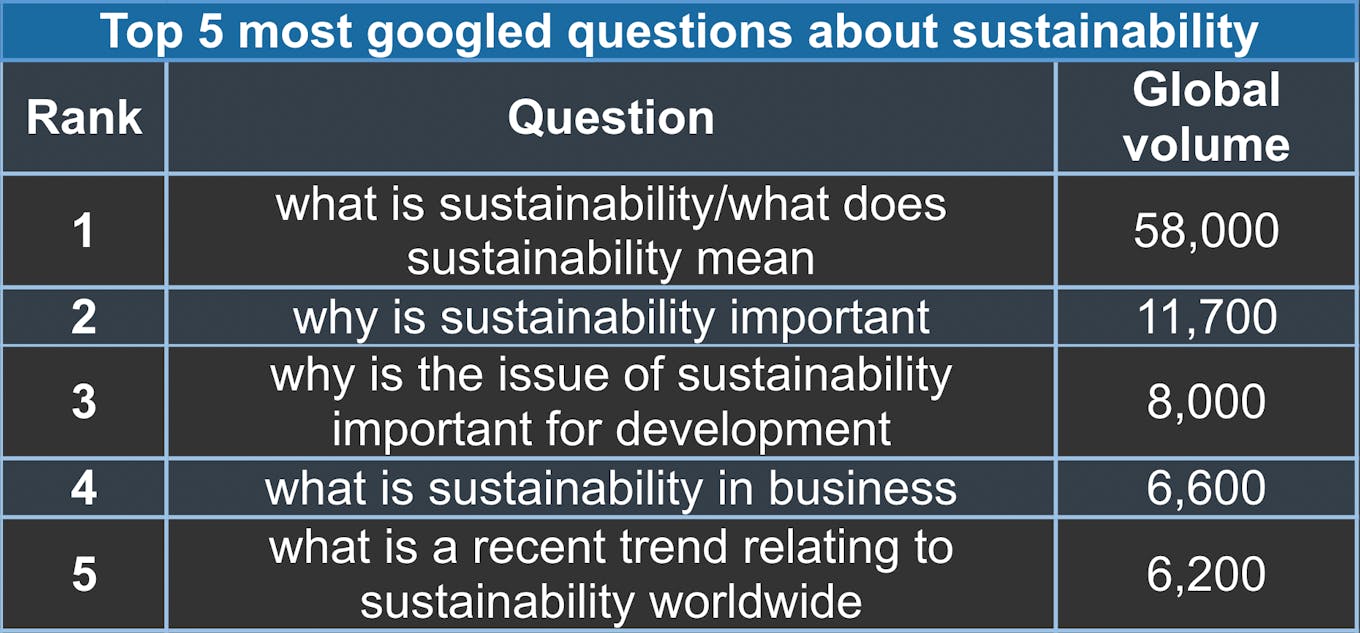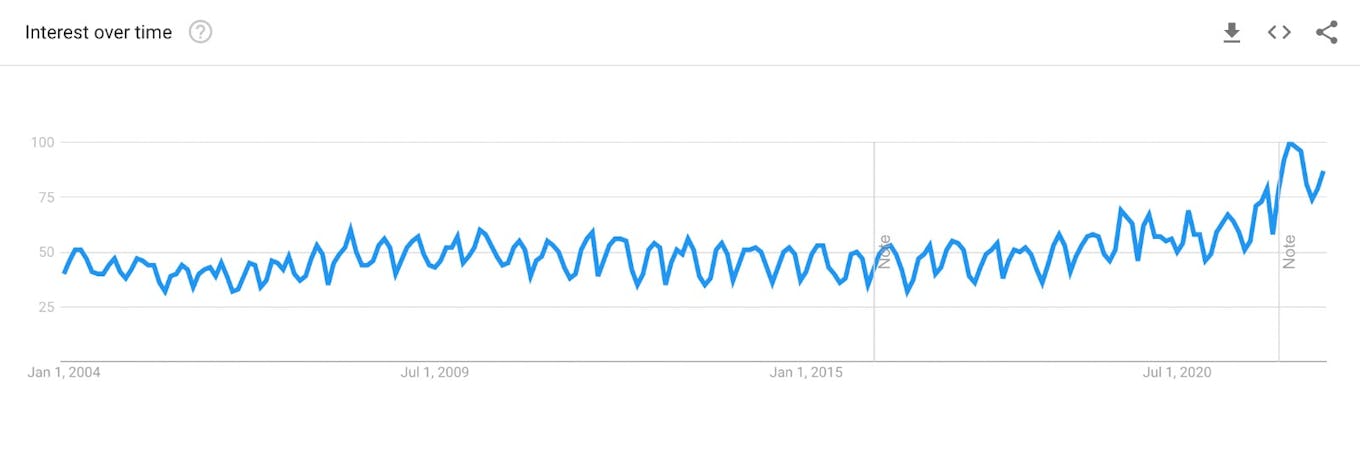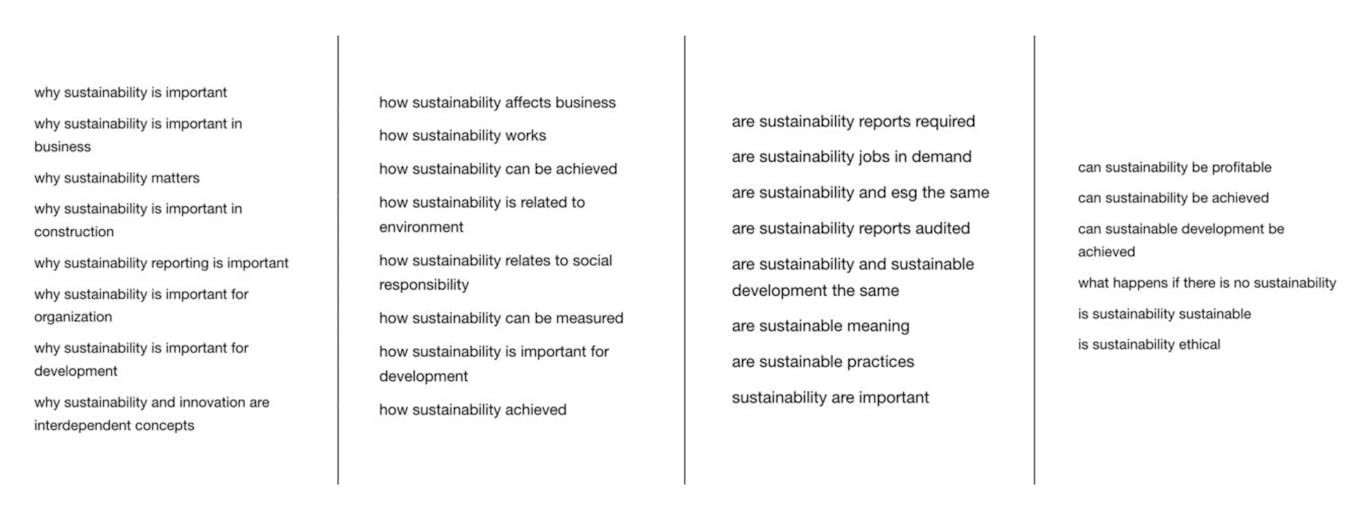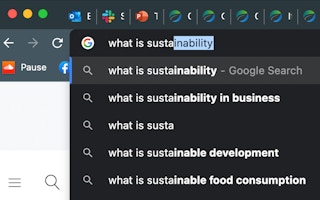The modern version of the word “sustainability” was coined by the United Nations in 1980s. Use of the word has spread in the years since, but a study of internet searches suggests lingering confusion over its meaning.
To continue reading, subscribe to Eco‑Business.
There's something for everyone. We offer a range of subscription plans.
- Access our stories and receive our Insights Weekly newsletter with the free EB Member plan.
- Unlock unlimited access to our content and archive with EB Circle.
- Publish your content with EB Premium.
The most commonly searched sustainability-related term this year is “what is sustainability?” and “what does sustainability mean?”, according to data collated from search engine Google by France-based plastics alternatives firm Drinking-Straw.com.
The next most Googled sustainability-related terms of the year are “why is sustainability important?” and “what is sustainability in business?”
The study’s findings reflect growing interest in sustainability, but also suggest the word is jargon, or is being poorly communicated, said Mike Savage, a journalist who writes for Tech for Impact, a technology solutions website.
“If you put most people on the spot, they would struggle to define what sustainability means. Sustainability is a bubble, and it is easy to forget that most people living outside of it find the term confusing,” he said.

The most Googled sustainability-related search terms. Source: drinking-straw.com
The word “sustainability” was originally used by the UN in a paper on sustainable development 1987 to mean meeting the needs of the present without compromising the needs of future generations. Its popularity has grown since the launch of the United Nations Sustainable Development Goals (SDGs) in 2015 and the COP climate talks, but the broad use of the word in many different contexts has splintered its meaning, said Cindy Yong, who manages communications for SecondMuse, a Singapore-based clean tech startup platform.
“
Sustainability is such a broad term, with no single standard definition, and every other company is claiming to be sustainable.
Kieran Kelly, CEO, Oceans Integrity
Sustainability has more commonly been used as short-hand for environmental conservation, but the word is now increasingly used to refer to the social side of sustainable development, as the SDGs placed the importance of tackling gender inequality and poverty alongside preserving life below water and taking climate action.
Misuse of the word has also emerged from the rise of greenwashing – that is, businesses and governments making exaggerated sustainability claims – Savage told Eco-Business. “The word sustainability is being bandied around in so many different ways that no wonder people are confused.”
A study of corporate filings in 2021 found that use of the word “sustainability” spiked in 2020, as companies responded to rising consumer awarness of environmental and social vulnerability in the wake of the Covid-19 pandemic.

Google searches for “sustainability” from 2004 to 2022. Searches have surged since the Covid-19 pandemic [click to enlarge]. Source: Google Trends
A study in April this year found that two-thirds of executives globally questioned whether their company’s sustainability efforts were genuine.
Kieran Kelly, chief executive of Indonesia-based plastic recycling company Oceans Integrity, said companies are using sustainability as a social media hashtag to drive interest around their brands.
“Sustainability is such a broad term, with no single standard definition, and every other company is claiming to be sustainable,” he said. Overuse and misuse of the word has risen in line with greenwashing, he said.
Savage said that companies needed to improve how they communicate sustainability. “Companies need to be clear by what they mean by sustainability, and not assume people will know what it means. Sometimes companies are using the word in full knowledge that it’s a confusing term.”
An analysis of autocomplete data from search engines like Google and Bing suggests that sustainability is also a befuddling concept for businesses, which are under growing regulatory and compliance pressure to improve their sustainability credentials.
Other common searches relate to how sustainability can be measured, achieved and profited from, and what the difference is between sustainability and environmental, social and governance (ESG), a term that has emerged from the financial world to monetise the push for responsible investing.

The most common questions related to sustainability punched into search engines, gleaned from autocomplete data on 24 September 2022 [click to enlarge]. Source: Answerthepublic.com
The autocomplete data also shows growing concern for why sustainability is important and the consequences of living beyond planetary boundaries – “what happens if there is no sustainability?” is a common search.
Kenny Peavy, a teacher with Green School, a specialist sustainability school in Bali, said that a connection with nature is critical to build a real understanding of sustainability. “We need a strong connection with nature first… before sustainability makes sense or matters,” he said.








